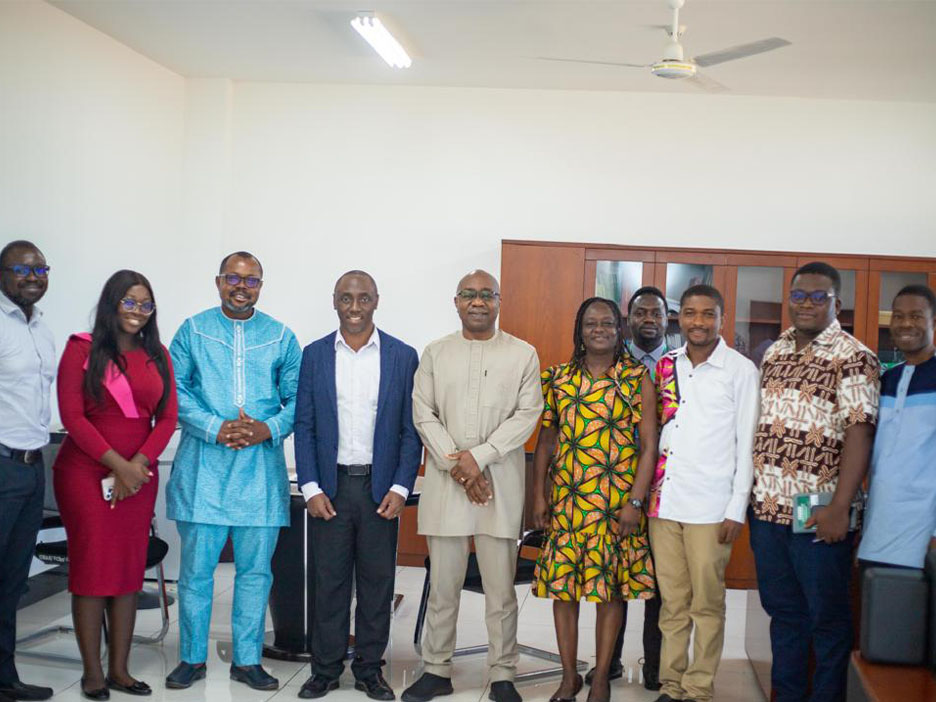
UHAS HOSTS PROPOSAL WRITING WORKSHOP ON NEONATAL INFECTION PREVENTION
The Centre for Malaria Research of the Institute of Health Research (IHR), University of Health and Allied Sciences (UHAS) hosted a two-day proposal writing workshop on Thursday, June 19, 2025 and Friday, June 20, 2025 at its main campus, Sokode-Lokoe, Ho.
The workshop was held in collaboration with the UHAS School of Medicine, UHAS School of Pharmacy and the Ministry of Health (MoH) toward developing a proposal entitled “Enhancing neonatal infection prevention and control in the Volta Region of Ghana: An implementation research study”, for onward submission to the International Centre for Antimicrobial Resistance Solutions (ICARS). Prior to the workshop, the Ghana team and the ICARS staff had been holding weekly virtual meetings towards co-developing the proposal.
Dr. Jonathan Mayito one of the officials of ICARS visited the Team in UHAS from 18th to 20th June, 2025, to facilitate the proposal development process and to conduct a field visit to two of the proposed intervention facilities, the Volta Regional Hospital in Hohoe and the Margaret Marquart Catholic Hospital in Kpando. The field trip to the selected hospitals offered the team first-hand information on how healthcare including neonatal healthcare is organized in the facilities.
The team also interacted with the Management of UHAS. During the interaction, the Pro-Vice Chancellor, Professor Frank Edwin lauded the high caliber and diverse nature of the team and expressed optimism that the writing workshop would produce a winnable proposal that will help the country to carry out research aimed at providing solutions to some of the critical challenges facing Neonatal Intensive Care Units (NICU) and the management of the use of antibiotics in facilities in the Volta Region.
The Acting Director of the Institute of Health Research (UHAS-IHR), Professor Kwame Ohene Buabeng called on participants to work towards partnering other collaborators in addressing the identified challenges in Ghana and other low- and middle-income countries.
The Director of the Centre for Malaria Research, UHAS-IHR and the coordinator of the workshop, Dr. Matilda Aberese-Ako, related that participants have been strategically selected from both national institutions and schools within the university, to ensure that the research would be rigorous and thus, produce findings, which could end up in driving policy in Ghana and beyond.
The Head of Department of Paediatrics and Child Health at UHAS School of Medicine and Principal Investigator of the project, Dr. Kokou Amegan-Aho, on his part indicated that the workshop would not only build the capacity of participants but also impact neonatal infection prevention and improve better health service delivery.
The ICARS Representative and the Science Advisor on the project, Dr. Jonathan Mayito said that irrational use of antibiotics leads to the emergence of antimicrobial resistance which results in ineffectiveness in the usage of medications administered to patients in critical cases in hospitals, hence ‘it is time to act and address the irrational use of antibiotics and infections among newborn babies.’ He gave the assurance that ICARS is committed to working with the government of Ghana, researchers and other stakeholders to formulate strategies targeted at the successful implementation of the project.
Dr. Mayito added that the goal of ICARS is to work with low- and middle-income countries on strategies to address irrational use of antibiotics in the treatment of infections. He cited some developed countries such as Denmark and Netherlands that have reduced the use of antibiotics in healthcare and production systems in poultry, dairy and other agricultural sectors. ‘The experience of these countries would be utilized in the continent as well,’ he said.
The MoH Representative, Dr. Emmanuella Abassah-Konadu reiterated the long-standing relationship between UHAS and MoH in research. She also assured the team of the support of MoH and expressed the desire that ‘we do not want the research to remain as an academic exercise but to also impact policy within the healthcare sector particularly the irrational use of antibiotics and neonatal infections.’
The workshop was successful as the set targets, which included completing aspects of the proposal such as the development and finalization of a problem tree, development and finalization of proposed interventions, development of log-frame and the formation of work packages were achieved. The team will continue to work in person as well as virtually with the ICARS and MoH team towards the attainment of the overall objectives of the project.
Every effort in UHAS is executed with utmost commitment to the mission of providing quality education and advancing knowledge through scholarship and research that improves health and quality of life. The workshop is one of such efforts.